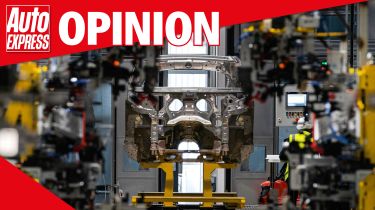“The car industry is insulated from economic turmoil but the car buyer is not”
The weak pound and rising prices will quickly make motoring more expensive. Andy Palmer explains how the car industry will be impacted in the longer term

Last year I appeared on BBC’s Question Time sitting next to soon-to-be Chancellor, Kwasi Kwarteng. Amidst a discussion about how the UK economy responds to the shock of COVID, I made the point to Kwarteng and others on the panel that “there is no magic money tree” and that cheap cash won’t last forever.
Well, since then I can only assume the Chancellor has spent a lot of time in his garden and has stumbled upon a sparkling great oak with twenty-pound notes for leaves! The recent ‘fiscal event’ (read budget) sent ripples through the markets with a tax cut package worth a whopping £45billion to the exchequer.
Shortly after the Chancellor left the chamber of the House of Commons, the pound slid to a 37-year low against the dollar and the FTSE dropped more than 2 per cent.
Watching news coverage of the economic fallout has been headache-inducing for many. Gilts, bonds and yields are terms usually reserved for boardrooms and glass towers in financial capitals, but they have a real-world impact on each and every one of us; mortgage rates, pension pots and the cost of living are all in flux.
For those of us who work in the auto industry, there are also question marks about what this means for our sector – already struggling to get to grips with crippling supply chain issues and the EV transformation.
In short, the weakening of the pound is unlikely to have an immediate, short-term impact on the auto industry. This is for multiple reasons: the first is hedging - this is the process of forward buying currency at a given and fixed exchange rate (for a fee). Companies generally hedge over a 1-3 year period. This gives some protection and stability to the auto companies that should take the immediate sting out of the wider economic consequences. For now.
Then there is the intervention from the Bank of England. The central bank has already indicated it will buy £65bn worth of UK government bonds to which the markets responded positively and pushed the pound’s value slightly higher when announced. The Bank is also expected to raise interest rates again at its next scheduled meeting in November, pushing up the cost of borrowing in an attempt to control inflation caused by the proposed tax cuts.
A weak pound is not all bad news for the auto industry. Cars purchased in sterling (effectively, those manufactured in the UK) are much cheaper for markets purchasing in Euros, dollars and other stronger currencies. That spells potential good news for exporters (post the hedged term).
If the pound’s weakness is going to be sustained for the long-term, it’s vital that we make the most of this opportunity by ensuring we have the domestic gigafactories in the UK to become a leading exporting nation once again.
If this is the long-term reality of Britain, we also need to face up to the fact that a weak pound means motoring is likely to get more expensive. On the contrary to exports, imports, such as buying imported cars, parts and fuel from overseas will become more expensive.
Thankfully, in addition to the hedging, there is a further level of insulation, as many manufacturers will hold substantial stocks of inventory on hand. But if the economic situation does not improve in the long-term, this will soon become a critical challenge for the industry that needs to be addressed.
We’ve spent many years arguing about the pros and cons of Brexit. Those who were proponents of our departure from the EU spoke at length about the ‘freedoms’ of leaving the bloc. We have a government who ideologically supports Brexit, so my hope is that they can identify those freedoms and make Britain an attractive source of inward investment.
Overall, the economic headlines are worrying – but, for the auto industry, we are unlikely to see a huge impact immediately. The challenge now is for automakers to insulate against rising costs due to a weakness in the pound and the government to provide markets with confidence that Britain is a good place to do business. They can start by pruning that money tree.
Click here for our list of the best-selling cars in the UK...
Find a car with the experts




